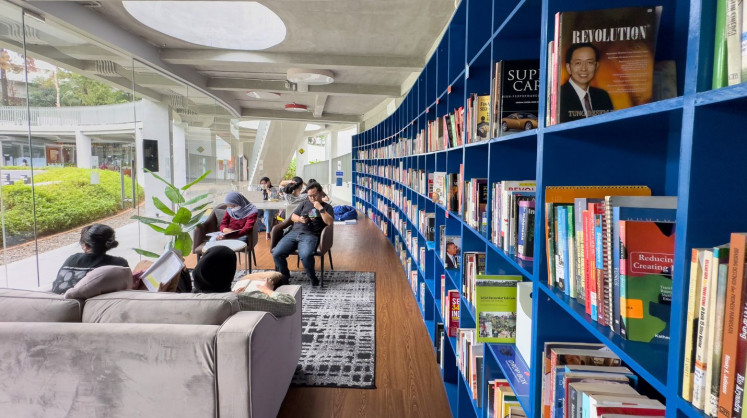Bright future ahead for Indonesia's property sector
Property businesses in Indonesia, particularly in Jakarta, are seeing favorable conditions that will allow for further growth next year
Change text size
Gift Premium Articles
to Anyone

P
roperty businesses in Indonesia, particularly in Jakarta, are seeing favorable conditions that will allow for further growth next year.
Although the magnitude of the sector's growth next year would not be as big as that in the past three years, analysts agreed that it would see significant growth, said Amran Nukman, chairman of the Jakarta branch of the Indonesian Real Estate Association (REI), as quoted by kompas.com.
'Property businesses will continue to grow next year, albeit at a slow pace. In 2012 we saw the sector grow by 40 to 60 percent. Next year we will only see 10 to 20 percent growth. Yet, [considering next year's likely favorable economic conditions], that amount of growth can be considered quite good,' he explained.
He further said that the declining growth in the property sector was caused by a number of factors, including the reluctance of some investors to expand next year due to the political uncertainties brought about by this year's legislative and presidential elections. Also, president-elect Joko 'Jokowi' Widodo has not been inaugurated, thereby his policies have yet to take effect. There is also the potential for change in next year's state budget on account of the new administration's fuel- price hike plan.
Amran said, nevertheless, that he remained optimistic that the sector would grow next year, taking into consideration the Jakarta administration's supportive stance on property businesses in the city.
The ascent of Basuki 'Ahok' Tjahaja Purnama as the city's acting governor has delighted many property developers, who perceive him as business-friendly.
'Ahok is very businessman-like. He can bring positive impacts to the property sector. This suits us [developers] in a convenient way,' Amran said.
'Ahok and his team members are now focusing on developing Jakarta's infrastructure.'
Several of the city's infrastructure projects, like the addition of new Transjakarta routes and buses, could be beneficial to the city's developers, said Amran. The development of new infrastructure would also push property sector growth in 2015. Nevertheless, the growth could result in negative consequences as Jakarta is already congested with various property projects.
Responding to this concern, Amran claims that the growth of property businesses poses no threats to Jakarta's spatial planning as the city administration has issued regulations related to property development, including the basic spatial planning blueprint and the land-building coefficient.
'The new legal products can be very useful for Jakarta's [spatial planning] in the years to come,' he said.
Good sales figures
Apparently, REI has a pretty good reason to be optimistic about growth in Jakarta's property firms.
A recent study conducted by property consultant Cushman and Wakefield reveals that sales from 30 residential estate projects in Greater Jakarta in the first semester of this year amounted to Rp 8.3 trillion (US$652 million).
Yet, the number is a decrease from last year's figure of Rp 8.35 trillion.
The average number of houses sold reached 100 units per month in each residential estate. The figure was a decrease of 13 units or 11 percent when compared to sales figures recorded in the same period last year, said Cushman and Wakefield Indonesia researcher and research advisor Anindya Prayascitta Samesti, as quoted by kompas.com
The implementation of Bank Indonesia's (BI) new rules on interest-rate hikes and down payments is what led to the decrease.
'Developers Paramount and Summarecon Serpong and Jakarta contributed the most to the overall sales figures in Greater Jakarta, followed by Bogor, Depok and Bekasi,' she said.
The study also indicates that the majority of houses were purchased by the upper socioeconomic bracket, accounting for 30 percent of total transactions'a slightly higher percentage than the middle-income bracket, which accounted for 29 percent of sales.
According to Cushman and Wakefield senior associate director as well as head of research and advisory Arief Rahardjo, as quoted by kompas.com, the prices of the most sought-after houses ranged between Rp 2.3 billion and Rp 4.8 billion, measuring 195 to 269 square meters with land spanning 220 to 300 square meters.
'Meanwhile, the middle-income bracket accounted for 24 percent of sales. The prices of the houses they purchased ranged from Rp 876 million to Rp 1.2 billion, measuring 47 to 90 square meters, with land spanning 62 to 105 square meters,' Arief added.
Meanwhile, homes purchased by the lower-income bracket accounted for 28.48 percent of sales. These buyers typically looked for houses with prices ranging between Rp 161 million and Rp 380 million, measuring 33 to 34 square meters, standing on a land spanning 78 to 90 square meters.
According to Arief, the central bank's new policies on interest rates and down payments are actually beneficial to developers in the sense that they help real estate agents sellers carefully select their clients. Previously, investors and speculators mostly bought houses, exploiting mortgage services offered by banks.
'But now, thanks to the rules, now end buyers make up the majority of home buyers in Indonesia,' he said.
Supply slowdown
Aside from BI's regulations, Indonesian banks have tightened their mortgage rules. Funds are now distributed to developers gradually in line with the buildings' construction progress. This has correspondingly contributed to supply slowdown.
He added that Indonesia's turbulent political conditions this year had caused hesitation in the market, making buyers reluctant to complete their transactions. Consequently, many developers seem to be disinclined from launching new clusters in their housing estates, at least until they see a change in Indonesia's political conditions at the end of this year or the beginning of next year. (JP)









